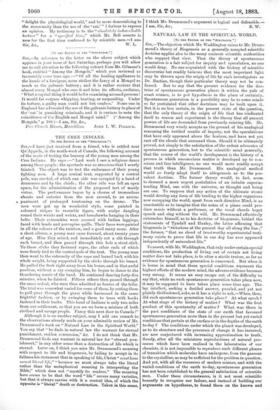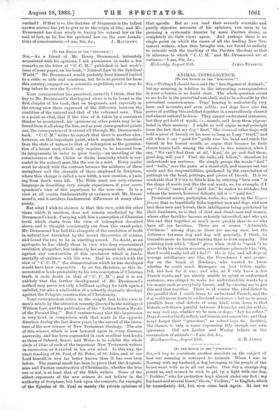NATURAL LAW IN THE SPIRITUAL WORLD.
[To THE EDITOR Or THE " EirzeriToa."1 SIR,—The objection which Mr. Waddington raises to Mr. Drum- mond's theory of Biogenesis as a generally accepted scientific doctrine applies also to the many eminent scientific authorities. who support that view. That the theory of spontaneous generation is a fair subject for inquiry and speculation, no one would deny. No one acquainted with the history of scientific discoveries but readily believes that the most important light may be thrown upon the origin of life by such investigators as Dr. Bastian, though their particular theory may not be con- firmed. But to say that the present evidence for the doc- trine of spontaneous generation places it within the pale of exact science, is to put hypothesis in the place of certainty. Spontaneous generation is a possibility may be to some minds so far postulated that other doctrines may be built upon it. But it is no less certain, in the present state of the question, that the only theory of the origin of life that has vindicated itself to reason and experiment is the theory that all present powers of life are descended from previously existing life. Mr. Drummond very wisely accepts as the ground of his analogical reasoning the verified results of inquiry, not the speculations that have only appeared above the horizon, and have not yet cast off the clouds that surround them. Should it be ultimately proved, not simply to the satisfaction of the ardent advocates of spontaneous generation, but to the scientific mind generally, that the course of the world's development is the history of a process in which unconscious matter is developed up to con- scious and free intelligence, no one would more readily accept that truth than Mr. Drummond. His analogical method would as freely adapt itself to abiogenesis as to the pre- valent doctrine. The former theory would, in fact, seem. to demand a more urgent postulation of an infinite superin- tending Mind, one with the universe, as thought and being are one. To suppose that any action of the ultimate atoms would develop any form of life tending to the higher organisms now occupying the world, apart from such directive Mind, is as_ unscientific as to imagine that the notes of a piano could pro- duce music without a performer, or the vocal chords beget speech and sing without the will. Mr. Drummond effectively entrenches himself, as to his doctrine of biogenesis, behind the statements of Tyndall and Huxley, the latter affirming that biogenesis is "victorious at the present day all along the line ;" the former, "that no shred of trustworthy experimental testi- mony exists to prove that life in our day has ever appeared independently of antecedent life."
To assert, with Mr. Waddington, that only under certain special' conditions, the production of living out of certain not living matter does not take place, is to utter a sterile truism, so far as evidence for spontaneous generation is concerned. But when it is borne in mind that these special conditions represent the highest efforts of the modern mind, the adverse evidence becomes very strong. It seems an easy escape out of the difficulty to say that, while no such spontaneous generation takes place now-, it may be supposed to have taken place some time ago. The . lay intellect, seeking a decided answer, puzzled, and yet not plainly disillusioned, asks, as it has a right to ask,—When, then, did such spontaneous generation take place ? At what epoch At what stage of the history of matter ? What was the first product of this spontaneity of matter ? What was there in the past conditions of the state of our earth that favoured spontaneous generation more than in the present but yet varied conditions that pertain at the surface or in the depths of the earth to-day ? The conditions under which the planet was developed, as to its structure and the processes of change it has incurred, are now conjectured with increasing approximation to truth. Surely, after all the miniature reproductions of natural pro- cesses which have been realised in the laboratories of our chemists, it is not impossible to reproduce such different phases of transition which molecules have undergone, from the gaseous to the crystalline, as may be sufficient for the problem in question. And yet, with all the resources of modern science, and with the varied conditions of the earth to-day, spontaneous generation has not been established to the general satisfaction of scientific men. Under these circumstances, is it not most scientific. honestly to recognise our failure, and instead of building our arguments on hypotheses, to found them on the known and verified? If that is so, the doctrine of biogenesis is the fullest answer science has yet to give as to the origin of life; and Mr. Drummond has done wisely in basing his natural law on the rock of fact, as he has his spiritual law on the sure founda- tions of conscionsness.—I am, Sir, &c., J. MATTHEWS.



































 Previous page
Previous page